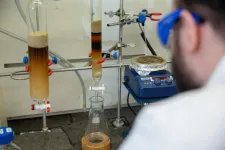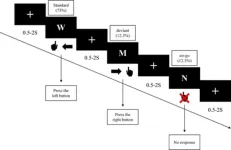(Press-News.org) In an analysis of samples from patients with rheumatic diseases, researchers from across Mass General Brigham found evidence that prior infection with a pre-pandemic coronavirus that causes the common cold may help set the stage for the development of long COVID
The study points to a potential marker of long COVID, which could inform clinical trials and may help explain why some patients develop long COVID
A patient population at increased risk for severe COVID-19 may help researchers understand why some people develop long-term, persistent symptoms (long COVID) while others do not. Rheumatologists from Brigham and Women’s Hospital and Massachusetts General Hospital, founding members of the Mass General Brigham healthcare system, teamed up with experts in immunology and virology from the from the Brigham’s Division of Infectious Diseases and the Ragon Institute of Mass General, MIT, and Harvard to look for clues about long COVID in blood samples from patients with systemic autoimmune rheumatic disease. The team found that among these patients, those who developed long COVID were more likely to have expanded, pro-inflammatory antibodies specific to a coronavirus that causes the common cold. Their findings suggest that a person’s viral history, especially prior infection and expansion of antibodies against a pre-pandemic coronavirus, could prime the immune system for developing long COVID. The new research is published in Science Translational Medicine.
“Our study offers evidence and explanation for why some of our patients may be experiencing the persistent and wide-ranging symptoms of long COVID,” said co-corresponding author Zachary Wallace, MD, MSc, of the Division of Rheumatology, Immunology and Allergy at Massachusetts General Hospital (MGH). “Identifying a biomarker that helps us better understand current and previous infections could shed light on an inappropriate immune response that leads to some cases of long COVID.”
Up to 45 percent of individuals with rheumatic diseases, which include rheumatoid arthritis and other chronic autoimmune disorders that cause inflammation, experienced persistent symptoms associated with long COVID 28 days after acute infection with SARS-CoV-2. Patients with rheumatic disease are also at risk for more severe disease and complications from acute infection.
Since the beginning of the pandemic, Wallace and his colleagues at the Brigham and MGH have paid special attention to this group of patients to find insights that could help inform their treatment as well as the care of broader patient populations experiencing long COVID.
“At the very beginning of the pandemic, we joined forces to identify every rheumatic disease patient with COVID seen at our institutions so that we could follow their clinical course and collect survey and blood data,” said co-corresponding author Jeffrey Sparks, MD, MMSc, of the Division of Rheumatology, Inflammation, and Immunity at Brigham and Women’s Hospital. “At first, we thought we might be doing this for a month or two, but the work continues today, and we are gaining important insights about a potential immune mechanism that may lead to long COVID, especially among patients with rheumatic disease.”
Wallace, Sparks, and colleagues compared immunological changes in patients with rheumatic disease who recovered from COVID-19. Specifically, investigators measured antibody responses against key antigens of SARS-CoV-2, comparing patients who developed long COVID to those who did not. They looked for differences in the immunological fingerprints left behind by previous infections. The team found an unexpected signal tied to OC43, a coronavirus that causes common-cold-like symptoms. Individuals with long COVID were more likely to have antibody responses specific to this form of coronavirus.
Mass General Brigham brings together 16 member institutions, including academic medical centers, top-tier specialty hospitals, community hospitals, a rehabilitation network and more. Research that spans more than one of these entities is more than the sum of its parts, helping to provide insights and unique perspectives from multiple settings and areas of expertise. Beyond the collaboration across MGH and BWH rheumatology, the work also represents a collaboration with researchers at the Ragon Institute, whose mission is to harness the immune system to prevent and cure human disease.
“When it comes to viruses, first exposure can shape lifelong immunity,” said co-corresponding author Galit Alter, PhD, who contributed to this work while at the Ragon Institute before joining Moderna Therapeutics in October 2022. “We know that, in the setting of influenza, previous exposure to a viral strain can influence a person’s immune response to subsequent strains. This concept — which we call ‘original antigenic sin,’ may be at play for coronaviruses too and may influence risk of long COVID, especially among individuals with rheumatic disease.”
The authors note that their study is restricted to individuals with rheumatic diseases, and further research is needed to determine if their findings will apply more widely to patients without a pre-existing autoimmune disorder. The researchers plan to further pursue biomarkers of long COVID, including the OC43 signature, which may be useful for developing diagnostics, therapeutics, and more targeted clinical trials to test interventions.
“By starting with patients with rheumatic diseases, we may be able to develop biomarkers that help us understand who is at high risk for developing long COVID and strategically enroll individuals into clinical trials to either prevent long COVID or develop therapies to treat it,” said Wallace. “This study represents an important step in that direction.”
Disclosures: Alter is an employee of Moderna Therapeutics and holds equity in Leyden Labs and performed consultancy for AbbVie, Amgen, Boehringer Ingelheim, Bristol Myers Squibb, Gilead, Inova Diagnostics, Janssen, Optum, and Pfizer unrelated to this work. Wallace reports research support from Bristol-Myers Squibb and Principia/Sanofi and consulting fees from Horizon, Sanofi, Viela Bio, Zenas BioPharma, Shionogi, and MedPace.
Funding: Support for this work was provided by Nancy Zimmerman, Mark and Lisa Schwartz, an anonymous donor (financial support), Phillip and Susan Ragon the SAMANA Kay MGH Research Scholars award, the Ragon Institute of Mass General, MIT, and Harvard, the Massachusetts Consortium on Pathogen Readiness, the National Institutes of Health (3R37AI080289-11S1, R01AI146785, U19AI42790-01, U19AI135995-02, U19AI42790-01, 1U01CA260476-01, CIVIC75N93019C00052, R01AR077607, P30AR070253, P30AR072577, K23AR073334, 1UL1TR002541-01, R03AR078938), the Gates Foundation, the Global Health Vaccine Accelerator Platform funding (OPP1146996 and INV-001650), the Musk Foundation, R. Bruce and Joan M. Mickey Research Scholar Fund, the Rheumatoid Research Foundation, and the Doris Duke Charitable Foundation.
Paper cited: Herman JD et al. “Humoral immunity to an endemic coronavirus is associated with postacute sequelae of COVID-19 in individuals with rheumatic diseases” Science Translational Medicine DOI: 10.1126/scitranslmed.adf6598
###
About Mass General Brigham
Mass General Brigham is an integrated academic health care system, uniting great minds to solve the hardest problems in medicine for our communities and the world. Mass General Brigham connects a full continuum of care across a system of academic medical centers, community and specialty hospitals, a health insurance plan, physician networks, community health centers, home care, and long-term care services. Mass General Brigham is a nonprofit organization committed to patient care, research, teaching, and service to the community. In addition, Mass General Brigham is one of the nation’s leading biomedical research organizations with several Harvard Medical School teaching hospitals. For more information, please visit massgeneralbrigham.org.
About the Ragon Institute of Mass General, MIT, and Harvard
The Ragon Institute of Mass General, MIT, and Harvard was established in 2009 with a gift from the Phillip T. and Susan M. Ragon Foundation, with a collaborative scientific mission among these institutions to harness the immune system to combat and cure human diseases. Focusing on diseases of global importance, the Ragon Institute draws scientists, clinicians and engineers from diverse backgrounds and areas of expertise to study and understand the immune system with the goal of benefiting patients. For more information, please visit ragoninstitute.org.
END
The shape and size of a grain of rice, the new device can conduct dozens of experiments at once to study the effects of new treatments on some of the hardest-to-treat brain cancers.
Researchers from Brigham and Women’s Hospital, a founding member of the Mass General Brigham healthcare system, have designed a device that can help test treatments in patients with gliomas, a type of tumor that originates in the brain or spinal cord. The device, which is designed to be used during standard of care surgery, provides unprecedented insight into the effects of drugs on glioma ...
ITHACA, N.Y. - As the Earth’s human population grows, greenhouse gas emissions from the world’s food system are on track to expand. A new study demonstrates that state-of-the-art agricultural technology and management can not only reduce that growth, but eliminate it altogether by generating net negative emissions – reducing more greenhouse gas than food systems add.
In fact, employing additional agricultural technology could result in more than 13 billion tons of net negative greenhouse gas emissions each year, as the world seeks to avoid dangerous climate extremes, according to research published Sept. 6 in PLOS Climate.
The work was led by Benjamin ...
Remembering the order of information is central for a person when participating in conversations, planning everyday life, or undergoing an education. A new study, published in the scientific journal PLoS One, shows that this ability is probably human unique. Even the closest relatives of humans, such as bonobos, do not learn order in the same way.
“The study contributes another piece of the puzzle to the question of how the mental abilities of humans and other animals differ, and why only humans speak languages, plan space travel, and have learned to exploit the earth so efficiently that we now pose a serious ...
Footballers wearing jerseys featuring small numbers are rated as more slender than those wearing big numbers, in experiments indicating how visual perception may be influenced by cognition
###
Article URL: https://journals.plos.org/plosone/article?id=10.1371/journal.pone.0287474
Article Title: Big number, big body: Jersey numbers alter body size perception
Author Countries: USA
Funding: The authors received no specific funding for this work. END ...
Jimmy Jiang envisions a future where every house is powered by renewable energy stored in batteries.
In his chemistry lab, Jiang and his students at the University of Cincinnati have created a new battery that could have profound implications for the large-scale energy storage needed by wind and solar farms.
Innovations such as UC’s will have profound effects on green energy, Jiang said. Batteries store renewable energy for when it’s needed, not just when it’s produced. This is crucial for getting the most out of wind and solar power, he said.
“Energy ...
UNIVERSITY PARK, Pa. — This summer, viral misinformation claimed that the Amish did not vaccinate against COVID-19 and, as a result, had a death rate 90 times lower than the rest of the United States. Now, a Penn State study is the first to provide geographically broad and population-wide evidence that while the Amish-populated counties across the nation tend to have lower vaccination rates than other populations, they are not entirely unvaccinated.
The research was published recently in the journal Population Research and Policy Review.
The Amish are a distinctive Christian subculture that traces its roots to the 16th century Protestant ...
A recent article published in Volume 3 of the journal Psychoradiology, researchers from Sichuan Normal University introduced an innovative Three-Choice BIC paradigm that merges the GNG and two-choice oddball (TCO) tasks. This study engaged 48 college students who responded to varied stimuli using designated keys and restrained responses to no-go stimuli. Employing functional neuroimaging coupled with conjunction and ROI analyses, the researchers sought to unveil unique neural pathways linked to BIC ...
ROCHESTER, Minn. — The treadmill exercise test with electrocardiogram (ECG), also known as an exercise stress test, is one of the most familiar tests in medicine. While exercise testing typically is focused on diagnosing coronary artery disease, a recent study from Mayo Clinic finds that exercise test abnormalities, such as low functional aerobic capacity, predicted non-cardiovascular causes of death such as cancer in addition to cardiovascular-related deaths. These new findings are published in Mayo Clinic Proceedings.
The exercise stress test is noninvasive, easily available and provides important diagnostic information. In addition to the ECG itself, ...
DENVER/Sept. 6, 2023 — A newly funded study will evaluate both the frequency and major risk factors for cancer in golden retrievers, a breed commonly affected by the disease.
The study will use data from Morris Animal Foundation’s Golden Retriever Lifetime Study, which is one of the largest and most comprehensive canine health studies in the world. The study will also incorporate data from Veterinary Companion Animal Surveillance System (VetCompass), a not-for-profit research project based at the Royal Veterinary College ...
LA JOLLA, CA—A good night’s sleep has many proven health benefits, and a new Scripps Research study suggests one more: preventing opioid relapse.
In the new study, published online in Neuropharmacology on August 12, 2023, scientists gave an experimental insomnia treatment to rats experiencing oxycodone withdrawal. The researchers found that the animals were far less likely to seek out drugs again in the future—even after ending the treatment. These findings could eventually lead to therapies to help prevent opioid addiction or relapse in humans.
“These results are very encouraging,” says Rémi Martin-Fardon, PhD, associate professor of molecular medicine ...



